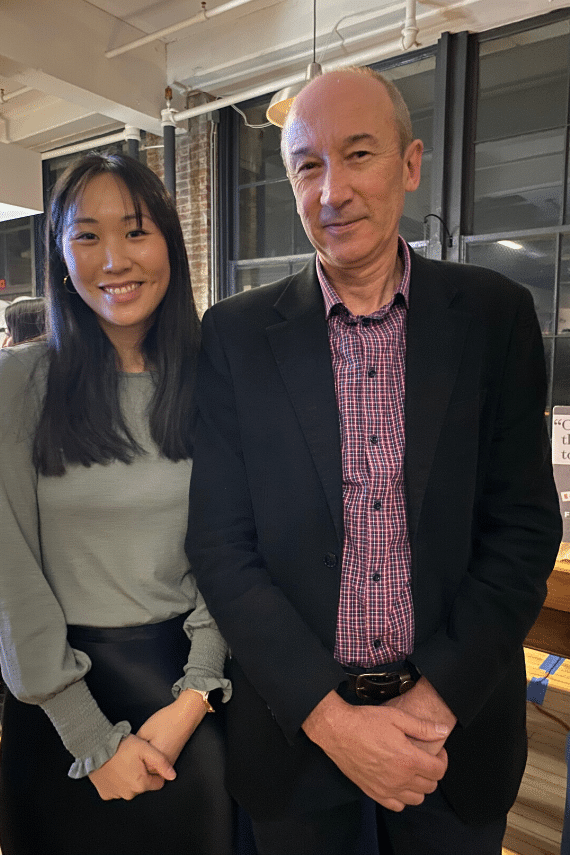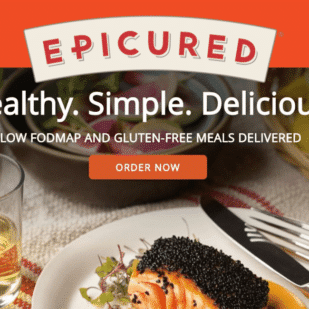Epicured’s Gut Health: FODMAPs & BEYOND
On October 26th, 2019, Epicured, a premier low FODMAP prepared meal-delivery company, partnered with FODMAP Friendly, Monash University, Beckon lactose-free ice cream, FOD Shop, Lifeway, FOOD: The Main Course To Digestive Health (a U of Michigan conference) and Owyn to present an evening event titled Gut Health: FODMAPs & BEYOND.

FODMAPs, Food & Fellowship
Held in an event space across the street from the Philadelphia Convention Center where FNCE, the annual dietitian-focused Food & Nutrition Conference & Expo, was being held, the evening brought together about 100 registered dietitians and gut health experts to learn about some of the most current ideas in relation to the low FODMAP diet.

We dined on Epicured food including their Hummus and crudité, Roasted Spiced Carrot & Parsnip Buckwheat Bowl with Lemon Tahini Dressing, Buddha Bowl with Mint Vinaigrette (my fave), Three-Spice Turkey Chili (Robin’s fave), Carrot Ginger Soup, Grilled Chicken and Orzo Salad and Epicured and Lifeway teamed up for a Farmers Cheese Crostini.

Thrive Market provided wine, which poured freely and an elegant low FODMAP mocktail was served combining cranberry and ginger flavors with a slight effervescence from tonic water or if you desired you could turn it into a cocktail with an added spirit from Simple Spirits. For dessert, Beckon Espresso, Salted Chocolate Chip & Vanilla ice creams were served along with a fudgy Epicured brownie and Epicured and Owyn presented a moist, spiced pumpkin bread.
Being able to eat delicious low FODMAP (and all gluten-free) food and mingle with those most interested in the diet was an incredibly energizing experience. And to see so many FODMAP-focused companies come together was truly inspiring.

Time For FODMAP Education
We were able to hear three different RDs present their take on current FODMAP research: Alyssa Lavy, MS, RD, CDN, Kate Scarlata, RD, who is my co-author of The Low-FODMAP Diet Step by Step and last but not least, our guest contributor to FODMAP Everyday®, Tamara Duker Freuman MS, RD, CDN, the author of The Bloated Belly Whisperer.
The over-arching takeaway from these presentations is that the nuances and complexities of the low FODMAP diet cannot be over-stated and that in fact, assessing patients during intake for how well suited they are to the diet can greatly affect whether they are ultimately successful with the diet.
As Kate so succinctly put it, “We have to select the correct candidates”.
She was addressing RDs and some red flags for them to look for in patients would include general food fears and related anxiety, an underweight condition, and/or a present eating disorder, to name a few.

Patients should of course be screened first for celiac and after a full-intake is performed, a course of action “tailored to the patient”, as Kate explained, can be determined.
As we listened to this introduction, I kept thinking about all the people we know who are attempting to navigate this diet themselves. For whatever reasons they have decided not to work with a FODMAP trained RD. We know there are legions of you.
[bctt tweet=”What we can tell you is that statistically you will have a much better chance of success if you do work with a RD.” username=”FODMAPeveryday”]
RDs Can Draw Upon Clinical Experience
Alyssa plainly stated that “100% can improve symptoms”, if they work closely with a RD. Now, this might seem like an overstatement. Indeed most statistics cap the possibility of improvement with the low FODMAP diet for those with IBS to be around 80%. But what Alyssa meant is that if you are working with a RD, they can observe your progression (or lack thereof), pivot if need be and make further recommendations for the patient that might effect relief. And this might mean even moving away from the traditional approach to the diet and incorporating other or additional actions.
Perhaps a strict low FODMAP diet is not what will bring about positive results? Only through the observation of a RD’s trained eye can this assessment be made. You might need a modified approach and as Alyssa told all of us, a RD can “tailor the intervention to the client”. (Are you sensing a theme here?)

If that same person were trying to navigate the diet on their own, chances are they would give up when relief didn’t come – and they perhaps would never know why what they were doing did not “work”, nor what might have been tried in its place.
Alyssa also mentioned the prevalence of ARFID (Avoidant/Restrictive Food Intake Disorder) and the fact that it has been added to the current DSM-V (Diagnostic and Statistical Manual of Mental Disorders) as a new diagnostic category.
Those with ARFID experience clinically significant struggles with eating and food and would not be good candidates for the diet. If one were self-diagnosing as a layperson, it would be difficult to objectively assess oneself. Alyssa mentioned Eatingdisorder.org and in fact, they have an Online Self Assessment, which might be of interest. Our caveat: we always recommend that you work with a RD and gastroenterologist.
The Bloated Belly Whisperer Speaks
We love Tamara (say “Ta-MA-rah”) and she has in fact written some of our most referenced articles. (Check out her article on Timing of Digestive Symptoms, in particular. Whether you are a RD or are struggling with IBS yourself, this article has incredibly helpful information).
Tamara told the crowd that the low FODMAP diet is “remarkably effective”, but when it doesn’t work for a patient, some serious detective work is often needed – and it is a time she does not relish as “the diet is (her) best trick”!

She said she was going to tell us the three reasons, in her clinical experience, why the diet doesn’t work. We all waited in anticipation – and then in a way that only Tamara can pull off, she asked us if we were still eating (chuckles ran through the crowd because of course we were). And then she declared that the #1 reason is that those “patients are full of poop! They have a high stool burden”.
She explained that one can have bowel movements everyday and still have a high stool burden, meaning that “there is a lot of stool in there”. This is exactly the type of knowledge that the layperson would not have. We have heard from many folks that they poop regularly, follow the diet accurately (to the best of their ability) and yet by the end of the day are “farting up a storm” and are “bloated out to there”, as Tamara described, and they are in pain and frustrated.

The #2 reason she believes is a misdiagnosis of IBS. “Many symptoms can mimic IBS,” Tamara explained, and recently she is seeing more prevalence of patients with CSID (Congenital sucrose-isomaltase deficiency). This disease is a genetic disorder that affects a person’s ability to digest sucrose and maltose and other compounds made from simple sugar molecules (carbohydrates). This can cause diarrhea, abdominal pain, and other symptoms – just like IBS. Again, not something to self-diagnose and in fact the gold standard for diagnosis in the U.S. is an endoscopic biopsy of the small intestine.
According to Tamara, reason #3 the low FODMAP might not be working is histamine overload. Many foods high in histamine are low in FODMAPs, so the diets are not easily compatible.
Ultimately, Tamara reinforced that the goal of the low FODMAP diet – and of the dietitian – is to help the patient “live their life in the least restrictive manner” possible.

Surrounded by Abundance
As we listened to the RDs and looked around the packed room, filled with people enjoying incredibly beautiful and delicious food and drink, I was struck by the abundance: by the bounty of healthful food; by the wealth of knowledge in the room, being freely shared.

Dr. Peter Gibson, Head of the Department of Gastroenterology at Monash University, who was on the original Monash team who developed the low FODMAP diet, was present with part of his current Monash team. In the midst of the evening, his cohort Alan Greensmith leaned over to me and said, “You know, if it were not for Dr. Gibson, none of us would be in this room”.
“That is so true,” I agreed.

And in that moment I was so proud to be part of this world. Every single person in that room, whether they were a new or experienced dietitian, a researcher, marketer or one of the sponsors – we were all there for one reason. To help everyone who might benefit from the low FODMAP diet receive the right diagnosis and treatment and to be able to thrive again.

We want to thank Epicured for bringing us all together. The event truly felt like collaboration in the best sense.
Whether you are a RD reading this, or someone just learning about the diet, we encourage you to visit the links provided below to learn more about the sponsors and the recommended reputable resources for the low FODMAP diet.









